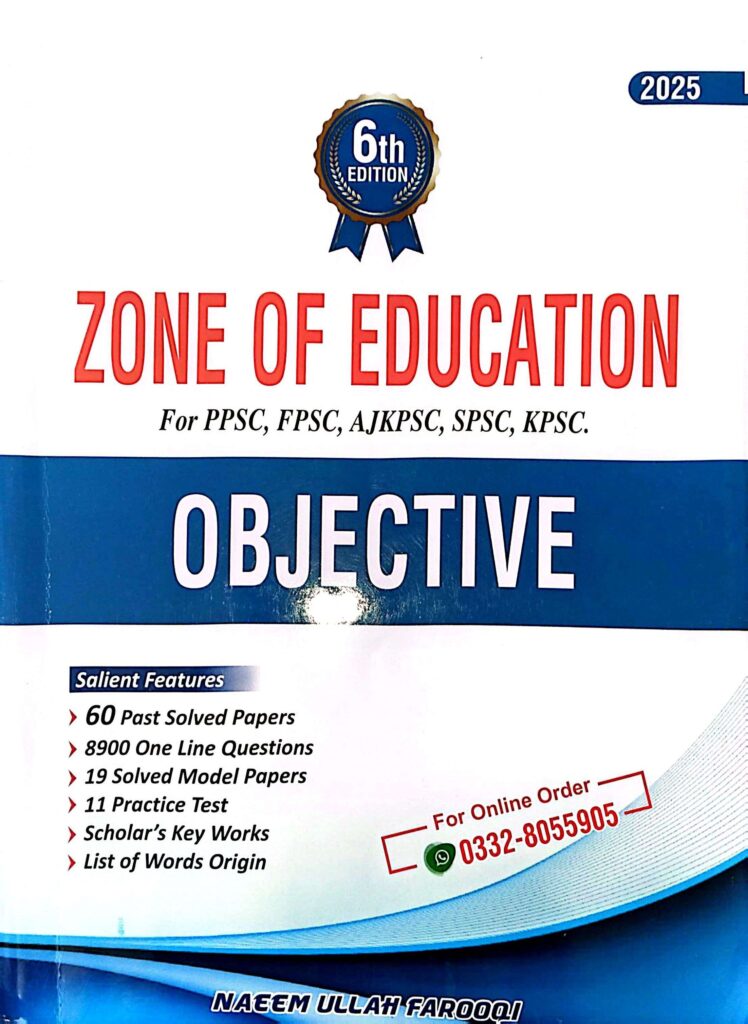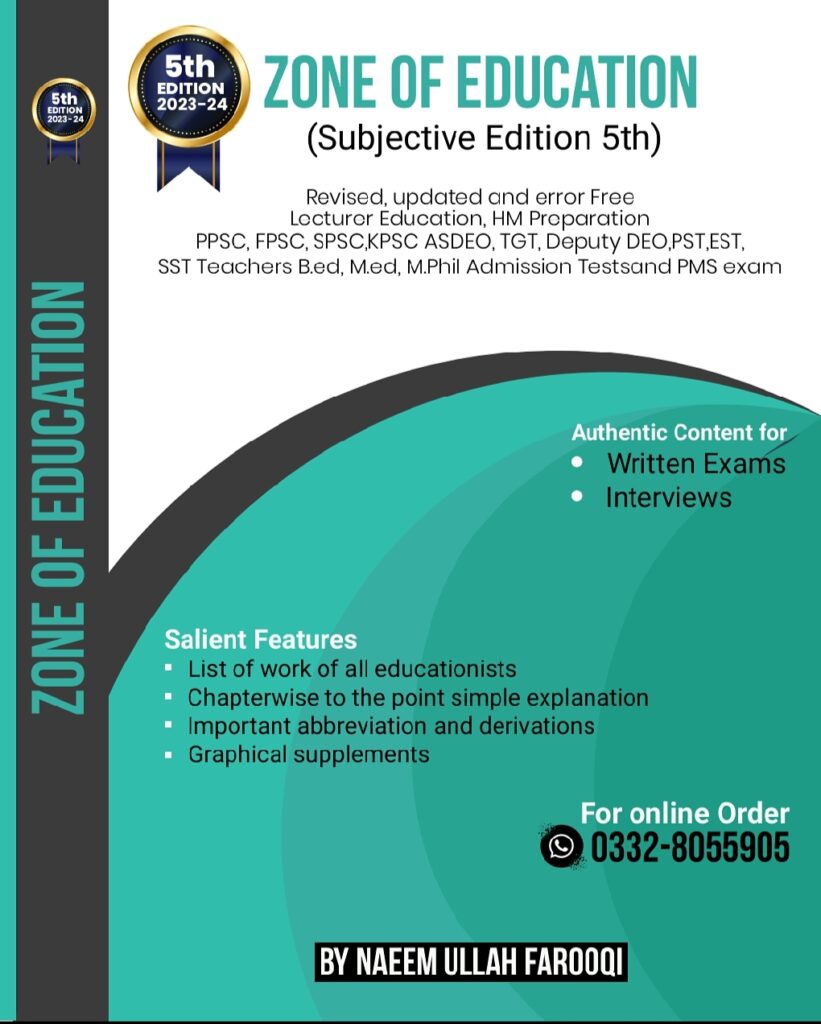Educational Psychology should provide prospective teachers with:
· (a) Insight into the various aspects of modern education
· (b) Principles, insights, and attitudes as points of departure for effective teaching
· (c) Research procedures by means of which to evaluate correct teaching procedures
· (d) Validated procedures to use in their teachings
24. The primary task of the teacher is:
· (a) To teach the prescribed curriculum
· (b) To stimulate and guide student learning
· (c) To promote habits of conformity to adult demands and expectations
· (d) To provide diagnostic and remedial aid wherever indicated
25. Which of the following is most likely to be the characteristic quality of the ineffective teacher?
· (a) Emphasis upon standards
· (b) Emphasis upon the control of the immediate situation
· (c) Refusal to help unless they have helped themselves
· (d) Differential treatment of students in the class
26. Which of the following teacher traits and procedures is most often given by children as the reason for not liking the teacher?
· (a) Irritable and bad temperament
· (b) Ignorance of the subject matter
· (c) Unfairness and favoritism
· (d) Unreasonable demands on the children
27. In an experiment, there are variables. Variable is?
· (a) Independent
· (b) Dependent
· (c) Organismic
· (d) All of the above
28. In an experiment, there is only one independent variable:
· (a) True
· (b) False
· (c) Neither True nor
· (d) None
29. The first step in conducting an experiment is:
· (a) To collect data
· (b) To set up a laboratory
· (c) To formulate a hypothesis
· (d) To interpret data
30. The first book of psychology was written by:
· (a) Kohler
· (b) William James
· (c) Clark Hull
· (d) Plato
31. The first book on Psychology titled “Principles of Psychology” was published in:
· (a) 1879
· (b) 1890
· (c) 1895
· (d) 1905
32. An emotionally mature person is one who:
· (a) Does not express his emotions
· (b) Is boastful
· (c) Has lack of patience
· (d) Has proper emotion at the proper time and expresses it in proper quantity in a proper way
33. Educational Psychology should provide prospective teachers with:
· (a) Insights into the various aspects of modern education
· (b) Principles, insights, and attitudes as points of departure for effective teaching
· (c) Research procedures by means of which to evaluate current teaching procedures
· (d) Rules of thumb to deal with everyday classroom situations
34. The primary task of the teacher is:
· (a) To teach the prescribed curriculum
· (b) To stimulate and guide student’s learning
· (c) To ensure that all students belong to socially acceptable peer groups
· (d) To promote habits of conformity to adult demands and expectations
35. Which of the following is the most important factor underlying the success of a beginning teacher?
· (a) His personality and ability to relate to the class
· (b) His attitudes and outlook on life
· (c) His verbal facility and organizational ability
· (d) His scholarship and intellectual ability
36. The greatest single cause of failure in beginning teachers lies in the area of:
· (a) General culture
· (b) General scholarship
· (c) Subject matter background
· (d) Inter-personal relations
37. Probably the best reminder a beginning teacher might take with him into his classroom is:
· (a) Knowledge of one’s subject is the crucial thing
· (b) Liking children is necessary and a sufficient condition for effective teaching
· (c) Pupil adjustment is the paramount educational objective
· (d) Learning is effective to the extent that it involves the goals and purposes of individual children
38. Which of the following is most likely to characterize the ineffective teacher?
· (a) Emphasis upon standards
· (b) Emphasis upon pupil discussion in the clarification of group goals
· (c) Emphasis upon the control of the immediate situation
· (d) Refusal to help children until they have helped themselves
39. The teacher’s major contribution towards the maximum self-realization of the child is best affected through:
· (a) Constant fulfillment of the child’s needs
· (b) Strict control of classroom activities
· (c) Sensitivity to pupil needs, goals, and purposes
· (d) Strict reinforcement of academic standards
40. The field of education is permeated by conflicts and misconceptions largely because:
· (a) The problems encountered in teaching call for subjectivity of interpretation
· (b) There are no best teaching methods and procedures
· (c) The problems encountered in teaching are not amenable to rigorous scientific investigation
· (d) Education has first to be practical and only secondarily to be scientific
41. Which method of research contributes most to the advancement of educational psychology as a science:
· (a) Clinical method
· (b) Experimental method
· (c) Historical method
· (d) Survey method
![]()
HUMAN GROWTH & DEVELOPMENT
1. Child’s heredity is determined at the time of:
· (a) Birth
· (b) Conception
· (c) Interview with the parents
· (d) Entry in the school
2. Is heredity opposed to the environment?
· (a) Yes
· (b) No
· (c) Neither of the above
3. The basic foundations of physical, mental, and personality development are laid in the period of:
· (a) Adulthood
· (b) Adolescence
· (c) Childhood
· (d) Infancy
4. The span of years during which boys and girls move from childhood to adulthood—mentally, emotionally, socially, and physically is called:
· (a) Late Childhood
· (b) Infancy
· (c) Adolescence
· (d) Adult years
5. Which is ‘Why’ age?
· (a) Early childhood
· (b) Late childhood
· (c) Puberty
· (d) Late adolescence
6. Later childhood is also known as:
· (a) Age of curiosity
· (b) Spontaneous age
· (c) Age of mental development
· (d) Gang age
Ø
Ø Directional development is also called cephaloacaudal and proximodistal development
Ø
9. Elizabeth Hurlock has written many books on:
· (a) Social Psychology
· (b) Mental Health
· (c) Child Psychology
· (d) Educational Psychology
10. The real carriers of heredity are:
· (a) The chromosomes
· (b) The genes
· (c) The nucleus of the cell
· (d) The ‘X’ and ‘Y’ chromosomes
11. Human development is determined:
· (a) Almost solely by the genetic makeup of the individual
· (b) Turning by individual resources over which the individual has no control
· (c) By a complex of inherited and environmental forces
· (d) The factors vary from individual to individual
12. Which of the following alternatives describes infant behavior?
· (a) Differentiated
· (b) Undifferentiated or generalized
· (c) Innate
· (d) Specialized
13. Fraternal twins are caused by:
· (a) Splitting of a fertilized egg
· (b) Two sperms entering one cell
· (c) One sperm fertilizing two egg cells
· (d) Two sperm cells fertilizing two egg cells
14. The master gland is:
· (a) Pituitary
· (b) Thyroid
· (c) Adrenal
· (d) The hypothalamus
15. Changes in behavior result from:
· (a) Learning alone
· (b) Maturation alone
· (c) Learning and maturation, both in important amounts
· (d) Maturation primarily
JOIN ZONE OF EDUCATIONPK!
Discover the most comprehensive and reliable pedagogy resources in Pakistan, curated for competitive exam success. Our content covers all competitive exam MCQs, including PPSC, FPSC, AJKPSC, SPSC, and more. Designed to empower learners with top-notch material and insights, trust us for your preparation journey!


